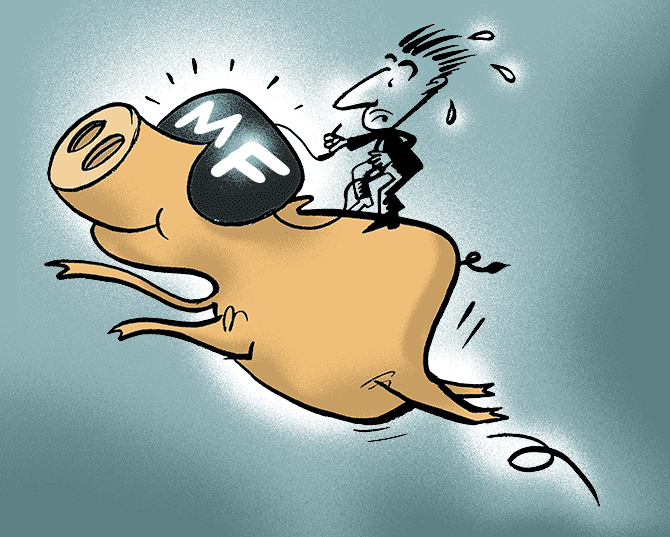Experts say a combination of improving asset quality and NBFCs’ weak balance-sheets bodes well for both corporate and retail banks.
Illustration: Dominic Xavier/Rediff.com

Mutual funds (MFs) are shuffling their sectoral exposures for 2019-2020 as they look to improve their portfolio returns.
MFs’ exposure to the banking sector jumped about 50 per cent as of March 31, 2019, from a year ago, amid expectations of a sharp earning recovery.
The exposure to the automobile sector declined in the same period, with growth expected to remain sluggish.
MFs’ exposure to banks stood at Rs 2.6 trillion at the end of FY19 compared to Rs 1.7 trillion as of March 31, 2018.
The exposure to auto and auto ancillaries, on the other hand, was Rs 65,675 crore, 16 per cent lower than the FY18-end numbers.
Experts say a combination of improving asset quality and non-banking financial companies’ (NBFCs’) weak balance-sheets bodes well for both corporate and retail banks.
“For corporate-facing banks, we are not seeing any fresh non-performing assets, and the older ones are well provided for.
"So, credit costs are coming down and profits should double. Retail banks are also well placed to gain market share,” said S Krishna Kumar, chief investment officer of Sundaram MF.
“With NBFCs facing stress, most private sector banks should be able to gain market share as they are better capitalised to participate in the incremental credit growth,” said Sonam Udasi, fund manager at Tata MF.
Fund managers are steering clear of the auto sector as they see it as a potential drag on the overall market earnings.
The stress in NBFCs and fears of lower disbursement have added to the negative sentiment around auto stocks.
“High channel inventory is forcing auto companies to resort to production cuts.
"Tight liquidity conditions and weak sentiment are also weighing on demand,” said Edelweiss analysts in a note.
However, experts say exposures to some other sectors can go up closer to the election results.
“Typically, after elections, the capex cycle tends to pick up.
"So, capital goods companies can come back in favour.
"Also, capacity utilisation levels are close to 70-75 per cent in some cases, so we could see private capex reviving as well,” said a fund manager, requesting anonymity.
As of March 31, 2019, fund managers’ exposure to capital goods stood at Rs 21,851 crore, which was 2 per cent of MFs’ overall equity assets.
Consumer is another sector that could see a revival after the elections.
“There has been a distress in the rural economy, which has led to slower volume growth.
"Both the major political parties are wooing rural electorate.
"So, whichever party comes to power, rural spending could get a boost,” Udasi said.
As of March 31, 2019, MFs’ exposure to consumer durables stood at Rs 26,484 crore (2.4 per cent of equity assets), and exposure to fast-moving consumer goods stood at Rs 81,697 crore (7.4 per cent of equity assets).












 © 2025
© 2025